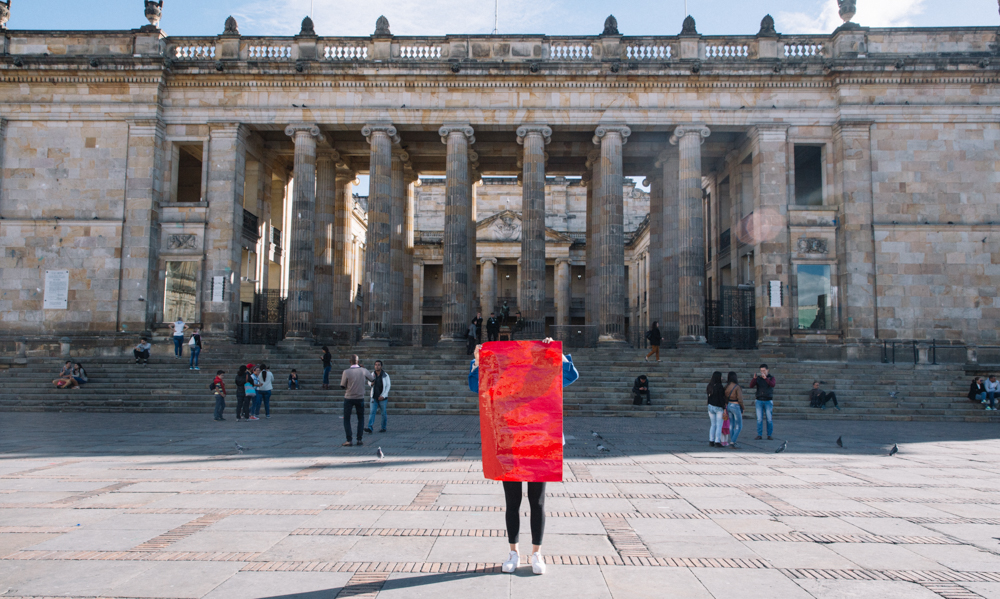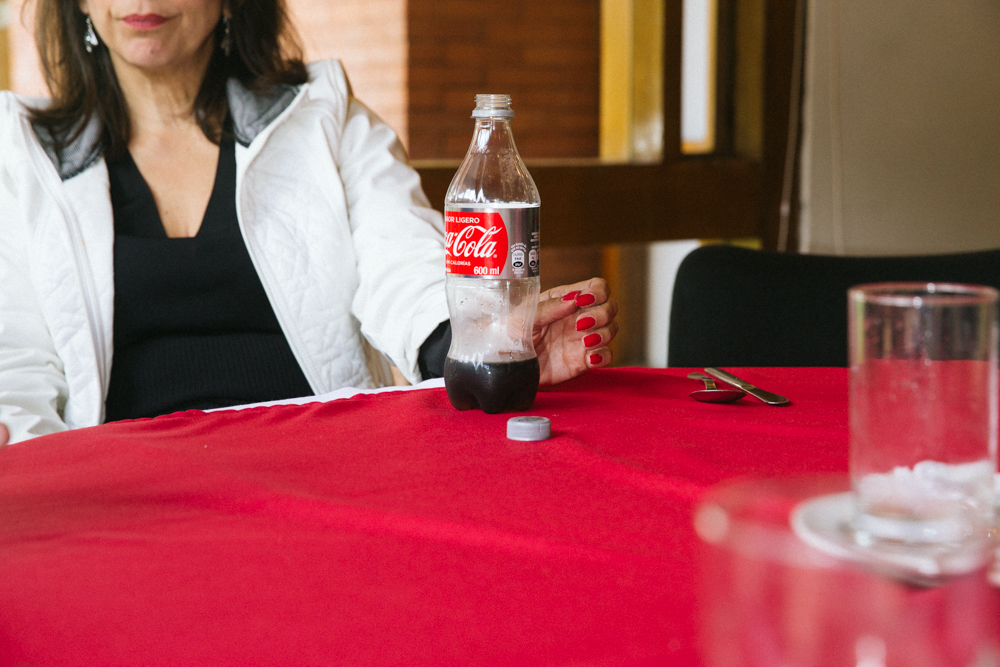Soda/Power, 2016
photographs (series)Funded by the Tinker Foundation and NYU's Center for Latin American Studies
This work documents the relationships of power as manifested in the production of soda in contemporary Colombia, and explores a broad confluence of factors affecting soda production and consumption, including socioeconomics, politics, and culture. The work revealed many levels of extremities as well as ambivalence that relate to soda consumption, and the soda bottle itself became as an artifact of power dynamics in the contemporary landscape.
Some of the most pressing power issues related to soda in Colombia are those of labor rights injustices and anti-union violence. While land rights and human rights issues have been associated with soda companies globally, these have particularly acute manifestations in Colombia. The Coca-Cola-owned bottling plants in Colombia have been accused of hiring illegal militia and paramilitary groups to intimidate, torture, and incite violence against union workers. According to Sinitrial, a labor rights group, the company uses subcontractors so that workers are unable to unionize, and thus they do not have to fulfill the country’s minimum wage and overtime laws. In 2017, Coca-Cola was accused by Colombian courts of financing terrorism for their ties to the now-disbanded paramilitary organization, United Self-Defense Forces of Colombia. (One location of alleged violence was photographed, above.) This image and others aim to show visions of a history of turmoil with Coca-Cola and provide more context to evaluate the place of soda companies abroad. Below is the site of the death of Ricardo Ramon Paublot Gomez, an activist for Coca-Cola worker’s rights who was targeted by the paramilitary. The union alleges that Coca-Cola hired the paramilitary to execute him.
Some of the most pressing power issues related to soda in Colombia are those of labor rights injustices and anti-union violence. While land rights and human rights issues have been associated with soda companies globally, these have particularly acute manifestations in Colombia. The Coca-Cola-owned bottling plants in Colombia have been accused of hiring illegal militia and paramilitary groups to intimidate, torture, and incite violence against union workers. According to Sinitrial, a labor rights group, the company uses subcontractors so that workers are unable to unionize, and thus they do not have to fulfill the country’s minimum wage and overtime laws. In 2017, Coca-Cola was accused by Colombian courts of financing terrorism for their ties to the now-disbanded paramilitary organization, United Self-Defense Forces of Colombia. (One location of alleged violence was photographed, above.) This image and others aim to show visions of a history of turmoil with Coca-Cola and provide more context to evaluate the place of soda companies abroad. Below is the site of the death of Ricardo Ramon Paublot Gomez, an activist for Coca-Cola worker’s rights who was targeted by the paramilitary. The union alleges that Coca-Cola hired the paramilitary to execute him.



| Left: Sinitrial union headquarters, the activist organization working to secure worker's rights at Coca-Cola plants in Colombia. Many members have experienced death treats, intimidation, and other scare tactics which they allege are committed by former FARC paramilitary agents hired by Coca-Cola. | Right: A stream from the Chingaza water resource that supplies the La Calera mountain towns. Residents are only permitted limited in water usage, but Coca-Cola is able to use water for production of soda, causing a bitter relationship between the company and local communities fighting for more access to potable water. |

| Left: Soda is shipped via boat to even the most remote islands and rural wetland communities of Colombia’s coastal regions, where it often comes more often than potable water. Soda company employees and vendors are not entitled to unionized workers rights. These extensive distribution networks were set up largely by American soda companies like Coca-Cola. | Right: Sugar cane production on one of the world's largest sugar cane farms—an industry with a deeply intertwined history with slavery and exploitation. Some of this sugar is used to manufacture soda in Colombia. |


Soda/Power reveals the various power relationships I encountered as I followed the raw materials utilized to make soda in Colombia through to the finished product’s consumption. Two major inputs into soda—sugar and water—reveal both historic and contemporary power struggles over valuable resources. Sugar production for soda companies is linked to a long and often fraught history in Colombia, including the history of the transatlantic slave trade and exceedingly inhuman labor pracices, as is the case in many sugar producing regions. At one of the country's largest sugar cane farms in Valle de Cauca photographed in this series, sugar is harvested for soda companies. Water, the other main ingredient in soda, represents a more contemporary set of human rights issues, as it is a highly contested natural resource in many parts of Colombia. Coca-Cola in particular has been accused by locals of natural resource exploitation at the expense of communities. I visited two in particular: the mountainous town of Chingaza, and Tocancipá, a town outside Bogotá, where a new Coca-Cola plant will use 68% of the entire municipality’s water.
The country's consideration of a soda tax when I visited in 2016 reveled another power struggle. While public health advocates favor such bills to protect citizens from the health ills associated with consuming high-calorie, sugary sodas, many argued that the economic ramifications for small vendors across the country would be too severe.
People's personal identities and lifestyles were entangled in these dynamics. One woman I interviewed (above) suffered from an addiction to Coca-Cola, for which she had been treated by both medical doctors and acupuncturists. She admitted she felt powerless to stop consuming soda at times.
She has a local bottling company deliver cases of Coca-Cola to her home weekly. Other interviewees, particularly in Cartagena, expressed cravings for sugar, and discussed the difficulty in abstaining from drinking too many sodas. Soda consumption raises issues of sugar addition, and individuals' own autonomy in controlling their diet. Furthermore, in interviews, individual's choices to drink either national brands (like Colombina or Postobón) versus imported brands (like Coca-Cola) seemed to relate to ideas about patriotism and nationalism.